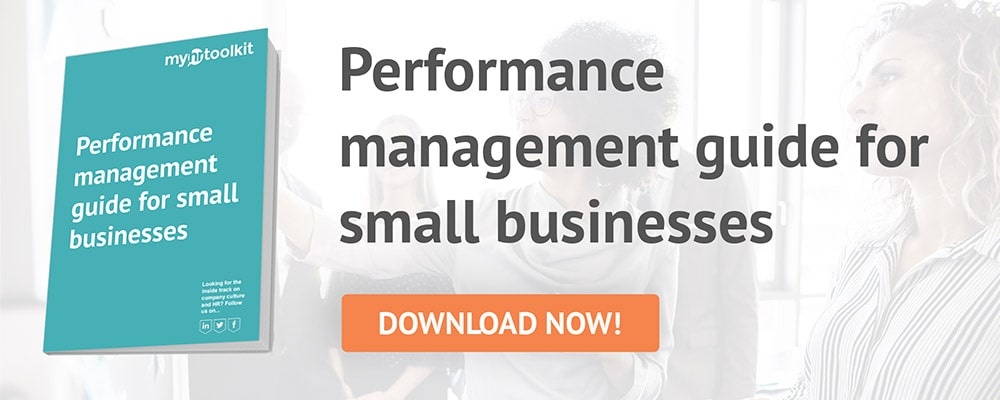Performance management is an important HR function within a business or organisation employing staff. It describes a number of strategies and activities that business owners and managers use to ensure employees’ performance levels are optimal across the organisation. This often involves rewarding good performance and providing support and/or disciplinary action where an employee is under performing in relation to agreed-upon benchmarks.
Getting performance management right can save a lot of issues for businesses down the line, such as undermotivated staff, grievances, and a lack of productivity, which can affect the organisation's bottom line. Continuous improvement and development in employees will also in the longer term lead to growth for the business by having a more motivated and skilled workforce.
A quick history of performance management

As performance management expert Helena White, HR consultant for HR Dept South West Devon, explained to us on our podcast:
"[Performance management] was introduced as a way for large companies to bring a bit of order to their employees and figure out who the best performing people were and who the less better performing people were. It's carried on without a huge amount of fundamental changes pretty much for the last 70 or 80 years. It's only really been in the last 5 years that there's started to be some changes.
"It started in Silicon Valley with Adobe and those sorts of companies, then it spread to the management consultant companies like Deloitte. Basically what they were saying was, we need to rethink this, it’s not working, and they came up with various themes about how to do it differently, but there’s some broad things that they’ve done the same."
We get more into how performance management is now below. If you'd like to learn more about its history, the Harvard Business Review have a great timeline depicting how approaches to performance management have shifted from a focus on the employee’s accountability to learning and development in response to a growing need for companies to be agile.
Performance appraisals

Performance management should be a continuous activity (or, in reality, set of activities) within an organisation, and having regular, distinct performance appraisals is an important part of this. During an appraisal, an employee and their manager discuss the employee’s performance (and how the manager can help with performance) to acknowledge work well done and any potential areas for improvement.
Read more: Are employers obliged to give an employee appraisal?
Traditionally, managers tend to organise an annual review with the employees they manage. HR consultant However, this has started to change in more recent years. Helena White said of the traditional approach:
"It leads to quite a fixed mindset about somebody’s performance. If somebody’s been performing averagely in the past, then the expectation is that they’ll continue performing averagely in the future and traditionally performance management systems have involved some sort of rating or scoring of the individual and sometimes that’s also been used alongside a way of comparing them against their peers.
"It’s taken up huge amounts of time; HR departments across the world have spent huge numbers of hours administering performance management systems, following up, trying to get all the meetings happening, and all the documentation together.
"It’s not seen as part of the job, it’s a separate process usually administered or pushed by HR, very rarely pushed from the top of the company and – hand on heart – really the amount of useful information that comes out of it, I’ve not seen many in my career that have genuinely helped people."
Many organisations have now adopted a more frequent approach to appraisals and performance with continuous monitoring and regular feedback from managers. Helena noted that, over the past few years, the focus for some larger companies has shifted towards the following:
- "A move away from looking backwards to looking forwards. Really saying to the employee: what do you need help with to do your job differently in the future and how can I, as your manager, help you with that?"
- "Much more frequent meetings, so it’s not seen as a once or twice a year big scary meeting. It’s something that’s built into the regular schedule of meetings that managers tend to have with their employees. It's just about taking 15-20 minutes once a fortnight/once a month to raise your head above the day to day, look a bit more towards the horizon, and say: that's where you need to be, how are we going to get there?"
- "Moving away from a fixed mindset to a growth mindset with the view that, with the right support and coaching, people can change and develop."
360-degree feedback
Some companies also choose to provide 360-degree feedback for employees, where feedback comes from more areas than an employee’s immediate manager (they may receive feedback from their colleagues within their team or from subordinates, for instance). This can provide employees with a more holistic understanding of their role in the organisation, what they’re doing well and providing for others, and what they can do to improve.
What about SMEs?
It may seem daunting for an SME to adopt a performance management system or update their approach, but Helena White explained why small and medium-sized businesses are perfect for a more modern, flexible style of performance management:
"It suits the SME to have a more flexible approach that’s integrated with their day to day work. If an SME doesn’t have a process in place, then my recommendation would be to look into adopting frequent, shorter, less bureaucratic meetings with employees that can be integrated into your day to day work and that are perhaps forward-focused, looking at developing your employees, rather than going over what they did or didn’t do a year ago, which isn’t going to help anybody.
"SMEs are quite well placed to adopt a more flexible, more forward-looking approach because it suits their businesses better. They’re not big bureaucratic companies that need to report to the board on what percentage of employees are in the exceeding expectations category. They just want to make sure that their employees are developing their skills and abilities and they want to do it in a way that’s not going to take a huge amount of management time and effort. "
Manage performance more effectively within your SME with flexible performance management tools.
Managing poor performance

Addressing poor performance can be difficult, but it's important to ensure the organisation continues to thrive. Taking an investigative approach, where you identify why someone is performing poorly (as this could be due to a range of reasons, from lack of training to personal difficulties) will hopefully help the employee get back on track with measurable objectives.
You can choose to address poor performance issues informally (with an informal meeting or conversation to find out more about why an employee may be performing poorly) or by using a more formal and documented process, which can be particularly important if you were to dismiss an employee for continual poor performance later down the line.
For more tips on this area of performance management, HR Director and author Gemma Dale has written an excellent guide for the myhrtoolkit blog on how to manage poor performance.
Poor performance and dismissal
Sometimes when an employee continues to perform poorly, dismissal may be the outcome. It’s important to follow a fair process, keep evidence of that process, and communicate with the employee clearly at every stage to avoid unfair dismissal or discrimination claims.
To find out more about this, read our guide on how to dismiss an employee for poor performance from senior employment lawyer Matthew Ainscough.
Remote performance management

Now that more staff are working from home or otherwise remotely, the need has risen for performance management processes and techniques that work well for remote and scattered teams.
The rise in remote working since 2020 has prompted necessary changes in how employers and managers view performance. There were fears around productivity drops, though these have proved unfounded in the majority of cases, as performance isn’t just about presence.
Instead of simply observing people in the office, now managers need to consider the results employees are delivering and measure their effectiveness and performance levels by what is produced.
There is also an increased need to have regular scheduled calls with employees to catch up on projects and tasks, making sure everyone is on the same page in terms of objectives and priorities.
Learn more: Introducing performance management when your workforce is remote
Listen to our performance management podcast
We interviewed HR Dept's Helena White about performance management and published it on our podcast - well worth a listen for even more information and tips around performance management, particularly for SMEs.
You can listen below or find our podcast on Spotify:
Further resources

Written by Camille Brouard
Camille is a Senior Marketing Executive for myhrtoolkit who writes on topics including HR technology, workplace culture, leave management, diversity, and mental health at work.


 Holiday Planner
Holiday Planner Absence Management
Absence Management Performance Management
Performance Management Staff Management
Staff Management Document Management
Document Management Reporting
Reporting Health and Safety Management
Health and Safety Management Task Management
Task Management Security Centre
Security Centre Self Service
Self Service Mobile
Mobile




